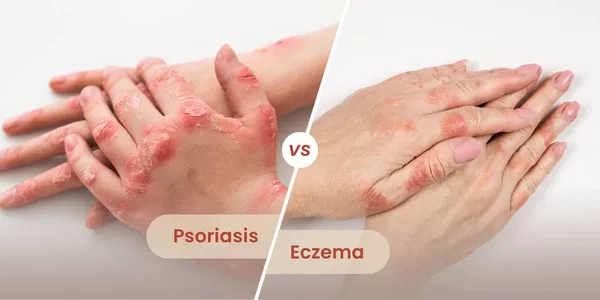Skin conditions can significantly impact one’s quality of life, affecting both physical comfort and emotional well-being. Among the most common dermatological ailments are psoriasis and eczema, both of which can cause discomfort, embarrassment, and frustration for those affected. While each condition presents its own set of challenges, determining which is “worse” can be subjective and dependent on various factors. In this article, we will delve into the characteristics of psoriasis and eczema, comparing their symptoms, triggers, treatment options, and overall impact on individuals’ lives.
Understanding Psoriasis and Eczema
Psoriasis and eczema are chronic skin disorders characterized by inflammation, itching, and skin abnormalities. Despite sharing some similarities in symptoms, they have distinct differences in their underlying causes and appearance.
Psoriasis is an autoimmune condition in which the immune system mistakenly attacks healthy skin cells, speeding up their turnover process. This rapid turnover results in the accumulation of thick, red, and often silvery scales on the skin’s surface. Psoriasis lesions commonly appear on the scalp, elbows, knees, lower back, and nails, though they can manifest anywhere on the body. Additionally, psoriasis can affect other parts of the body, including the joints, leading to a condition known as psoriatic arthritis.
Eczema, also referred to as atopic dermatitis, is a chronic inflammatory skin disorder characterized by dry, itchy, and inflamed patches of skin. Unlike psoriasis, eczema is not an autoimmune condition but is believed to involve a combination of genetic, environmental, and immune system factors. Eczema flare-ups can occur anywhere on the body but are commonly found on the face, neck, hands, and flexural areas such as the inside of elbows and knees.
Comparing Symptoms
Both psoriasis and eczema can cause significant discomfort and distress to those affected. However, the specific symptoms and their severity can vary between the two conditions.
Psoriasis symptoms may include:
- Thick, red patches of skin covered with silvery scales
- Itching, burning, or soreness
- Dry or cracked skin that may bleed
- Nail changes, such as pitting or discoloration
- Joint pain and swelling in cases of psoriatic arthritis
Eczema symptoms may include:
- Dry, scaly, or leathery patches of skin
- Intense itching, especially at night
- Redness and inflammation
- Oozing or crusting of affected areas, particularly during flare-ups
- Skin discoloration or changes in pigmentation over time
While both conditions can cause discomfort and embarrassment, psoriasis is often characterized by thicker, more pronounced lesions with silvery scales, whereas eczema tends to present with more diffuse redness and itching.
Triggers and Contributing Factors
Identifying triggers and understanding contributing factors can be crucial in managing both psoriasis and eczema effectively. While the exact cause of these conditions remains unknown, several factors can exacerbate symptoms and lead to flare-ups.
Psoriasis triggers may include:
- Stress or emotional upheaval
- Certain medications, such as lithium or beta-blockers
- Infections, particularly streptococcal infections
- Injury to the skin, known as the Koebner phenomenon
- Hormonal changes, such as those occurring during puberty or menopause
Eczema triggers may include:
- Allergens, such as pet dander, pollen, or dust mites
- Irritants, including soaps, detergents, and harsh skincare products
- Dry skin and low humidity levels
- Certain foods, such as dairy, eggs, or nuts (in some cases)
- Stress or emotional factors
While triggers can vary from person to person, avoiding known triggers and adopting strategies to manage stress can help reduce the frequency and severity of flare-ups for both psoriasis and eczema sufferers.
Treatment Options
Effective management of psoriasis and eczema often requires a multifaceted approach tailored to the individual’s specific needs and preferences. Treatment options may include:
- Topical corticosteroids or other anti-inflammatory creams and ointments
- Phototherapy (light therapy) using UVB or PUVA (psoralen plus ultraviolet A) light
- Oral medications, such as methotrexate, cyclosporine, or biologics
- Systemic treatments, including oral retinoids or immunosuppressants
- Lifestyle modifications, such as stress management and avoiding triggers
Eczema treatments:
- Moisturizers and emollients to hydrate and protect the skin barrier
- Topical corticosteroids or calcineurin inhibitors to reduce inflammation
- Antihistamines to relieve itching and discomfort
- Wet wrap therapy to soothe and moisturize severely affected areas
- Immunomodulators, such as dupilumab, for moderate to severe cases
In addition to medical treatments, maintaining good skincare practices, avoiding irritants, and managing stress can play crucial roles in managing both psoriasis and eczema.
Impact on Quality of Life
Living with psoriasis or eczema can have a profound impact on individuals’ physical and emotional well-being. Both conditions can cause discomfort, pain, and self-consciousness, leading to feelings of isolation and low self-esteem. Furthermore, the visible nature of these skin disorders can result in social stigma and discrimination, affecting relationships, employment opportunities, and overall quality of life.
Studies have shown that psoriasis and eczema sufferers may experience higher levels of anxiety, depression, and decreased quality of life compared to the general population. The chronic nature of these conditions, along with the unpredictability of flare-ups, can create ongoing challenges for individuals and their families.
Conclusion
In conclusion, determining whether psoriasis is “worse” than eczema is not a straightforward comparison. Both conditions present unique challenges and can significantly impact individuals’ lives in various ways. While psoriasis is characterized by thicker, scaly patches of skin and may be associated with joint pain in some cases, eczema often manifests as dry, itchy, inflamed patches that can occur anywhere on the body.
Effective management of psoriasis and eczema requires a comprehensive approach that addresses symptoms, triggers, and individual needs. By working closely with healthcare professionals, adopting healthy lifestyle habits, and seeking support from peers and community resources, individuals can improve their quality of life and better manage the challenges associated with these chronic skin conditions.
























